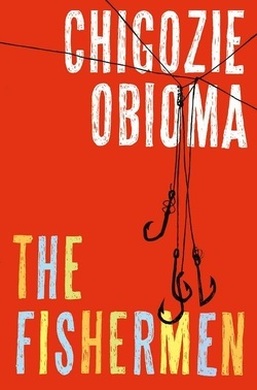| In a small town in western Nigeria, in January 1996, nine-year-old Benjamin and his three older brothers take advantage of their disciplinarian father’s absence, and their mother’s preoccupation with their two younger siblings, to go fishing, instead of studying, after school. So absorbed in their secret new hobby, they continue every school day for six weeks, although the eldest, Ikenna, understandably becomes reluctant after a local “madman” tells him he will be killed by “a fisherman”, presumably one of his brothers. However, what finally puts a stop to their enterprise, is one of their neighbours informing their mother, who then tells their father on one of his weekend visits home. The father takes a whip to the boys, with Ikenna the most severely punished, after which, the fifteen-year-old’s behaviour spirals out of control. |
While these children are required to excel in their education, they’re not expected to have minds of their own, even to the extent that the father has decided on their careers (apart from that of the only girl in the family), and the mother can extract secrets from their minds (p83):
Both she and Father were good at digging into our minds. They knew how to burrow so deep into our psyche when they wanted to find things out that it was sometimes difficult to think they didn’t already know what they were asking about, but were merely seeking to confirm it.
Recent Nigerian politics form the backdrop to the novel, adding another layer of turbulence with which the family is beset (to the extent that the prospect of sending a couple of the children to live with a family friend in Canada is met with unalloyed joy). Having also seen references to this novel as an allegory of the state of the Nigerian nation, I was a little anxious that my limited knowledge of the country leave me blind to the links. But, on a basic level, they’re not difficult to find: a heavy-handed coloniser/father withdraws from the country/family without having adequately prepared the local politicians/his sons for independence, or ever having taken responsibility for the inevitable tensions in a country cobbled together from different ethnic groups/sibling rivalries within a large family. The novel helped me understand, to a degree, the extent of corruption within so many African countries; perhaps, as we underestimate how difficult it is to leave controlling parents, we also underestimate the difficulty of creating good governance after shaking off a colonising power.
| Congratulations to Chigozie Obioma on being shortlisted for the Guardian First Book Award. The Fishermen is published by One, an imprint of Pushkin Press, which provided my review copy. As I read this novel shortly after rehearsing a somewhat more appreciative account of fishermen, I couldn’t help but leave you with this. It’s very much a Marmite song with some loving and others hating it. Unfortunately I couldn’t find a version I liked with the full range of voices. What do you think? | |






















 RSS Feed
RSS Feed





















